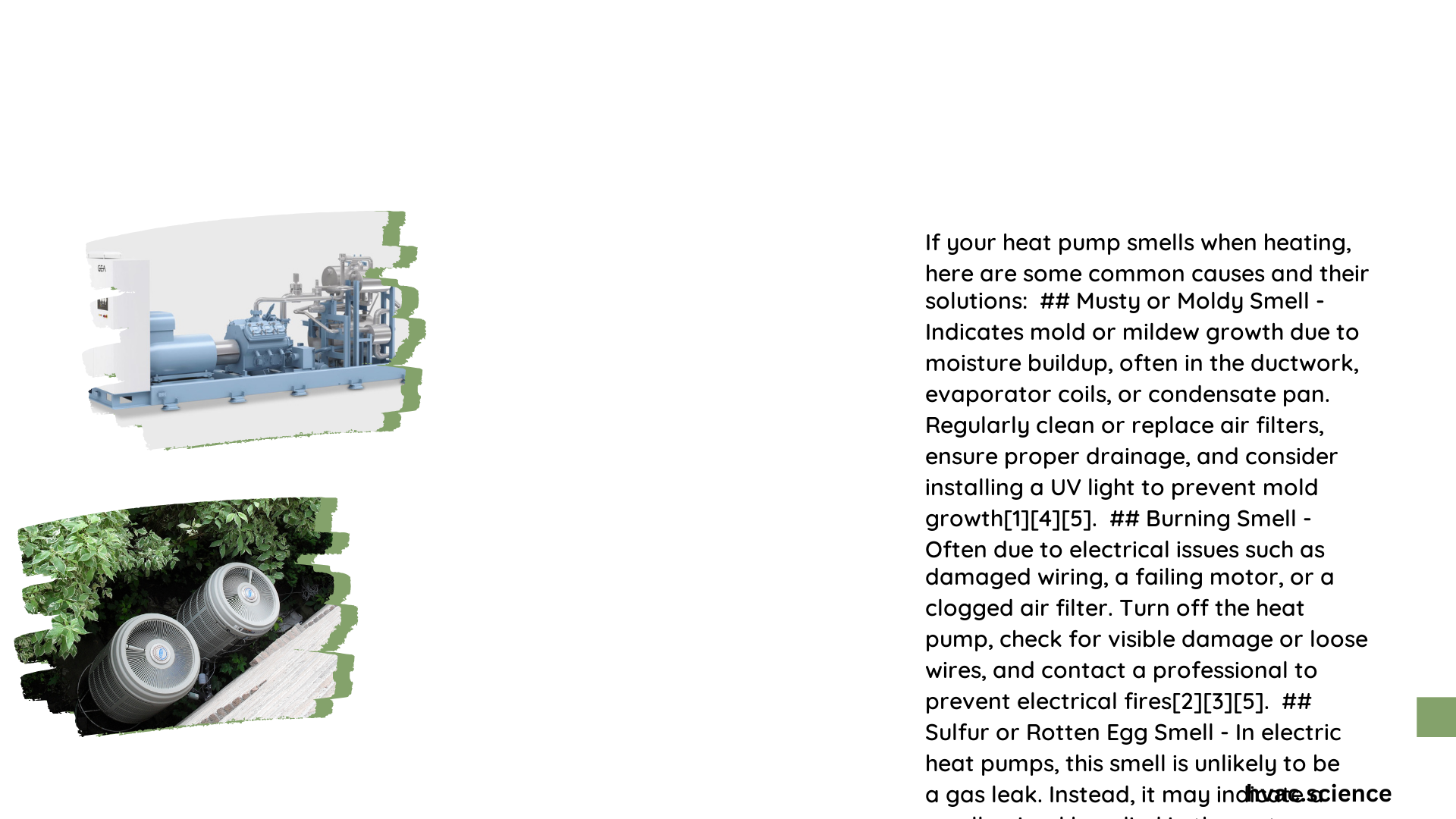Heat pump smells when heating can be a cause for concern, indicating potential issues with your HVAC system. These odors range from musty and damp to burning or electrical smells, each signifying different problems. Understanding the causes, identifying the type of smell, and knowing how to address these issues are crucial for maintaining a healthy and efficient heating system. This article explores common heat pump odors, their causes, and effective solutions to ensure your home stays comfortable and odor-free.
What Are the Common Types of Heat Pump Smells?
Heat pumps can emit various odors, each indicating a specific issue:
- Musty or Damp Smell
- Burning Odor
- Rotten Egg or Sulfur Smell
- Electrical or Metallic Smell
- Sewer-like Odor
Let’s delve into each of these smells and their potential causes.
Why Does My Heat Pump Smell Musty When Heating?

A musty or damp smell from your heat pump is often associated with:
- Mold or mildew growth on evaporator coils
- Moisture buildup in ductwork
- Clogged or dirty air filters
- Poor drainage in the condensate pan
This odor is particularly common during high humidity periods or when the heat pump operates in defrost mode. The accumulation of moisture creates an ideal environment for mold and mildew growth, leading to the infamous ‘dirty sock syndrome.’
How to Address Musty Smells:
- Clean or replace air filters regularly
- Schedule professional cleaning of evaporator coils
- Ensure proper drainage of the condensate pan
- Consider installing a UV light to prevent mold growth
- Use a dehumidifier to control indoor humidity levels
What Causes a Burning Smell from My Heat Pump?
A burning odor from your heat pump can indicate several issues:
- Dust buildup on heating elements
- Overheating motor
- Electrical wiring problems
- Melting plastic components
This smell often occurs when the system is first turned on for the heating season, as dust that has settled during the off-season burns off. However, if the smell persists, it could signal a more serious problem.
Steps to Take for Burning Smells:
- Turn off the heat pump immediately
- Check and replace the air filter if necessary
- Schedule a professional inspection to check for electrical issues
- Have the blower motor and other components examined for wear and tear
Why Does My Heat Pump Smell Like Rotten Eggs?
A rotten egg or sulfur smell can be alarming and may indicate:
- Gas leak (if you use natural gas)
- Overheating of rubber or plastic components
- Dead animal in the ductwork
- Malfunctioning circuit board
This odor requires immediate attention as it could signify a potentially dangerous situation.
Actions for Rotten Egg Smells:
- Turn off the heat pump and evacuate the area if you suspect a gas leak
- Contact your gas company or HVAC professional immediately
- Have the ductwork inspected for any deceased pests
- Check for any melting components within the heat pump
What Causes an Electrical or Metallic Smell from My Heat Pump?
An electrical or metallic odor often indicates:
- Overheating motor
- Wiring issues
- Worn out capacitor
- Malfunctioning compressor
This smell can be a precursor to system failure or even an electrical fire, so prompt action is crucial.
Addressing Electrical Smells:
- Turn off the heat pump immediately
- Schedule an emergency inspection with an HVAC technician
- Have all electrical components checked and replaced if necessary
- Ensure proper voltage and amperage to the system
How Can I Prevent Heat Pump Smells?
Preventing heat pump smells involves regular maintenance and proactive measures:
- Schedule annual professional maintenance
- Change air filters every 1-3 months
- Keep the area around the outdoor unit clear of debris
- Maintain proper indoor humidity levels (30-50%)
- Address any water leaks or moisture issues promptly
- Consider installing air purifiers or UV lights in the HVAC system
When Should I Call a Professional for Heat Pump Smells?
While some minor odors can be addressed through DIY methods, certain situations warrant professional attention:
- Persistent smells despite basic maintenance
- Any burning or electrical odors
- Sulfur or gas-like smells
- Significant decrease in heating efficiency
- Unusual noises accompanying the smells
A qualified HVAC technician can diagnose and resolve complex issues safely and effectively.
What Are the Costs Associated with Fixing Heat Pump Smells?
The cost of addressing heat pump smells varies depending on the cause and required solution:
| Issue | Estimated Cost Range |
|---|---|
| Air filter replacement | $20 – $100 |
| Professional cleaning | $100 – $400 |
| UV light installation | $200 – $800 |
| Motor replacement | $200 – $1000 |
| Compressor replacement | $1000 – $2500 |
Regular maintenance can help prevent costly repairs and extend the lifespan of your heat pump system.
By understanding the various types of heat pump smells when heating, their causes, and appropriate responses, you can maintain a comfortable and safe home environment. Remember, when in doubt, it’s always best to consult with a professional HVAC technician to ensure the proper functioning and longevity of your heating system.
References:
1. Air Commanders – 6 Common Heat Pump Smells Explained
2. Grove HVAC – 5 Common Heat Pump Smells & How to Fix Them
3. Boothe’s Heating, Air, Plumbing, Drains & Electrical – Most Common Heat Pump Smells & How to Fix Them
